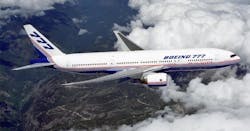You see, Rosenker is a big proponent of autonomous vehicle (AV) technology largely due to the experience with it in commercial aviation. While I myself remain decidedly uncomfortable with such systems, he believes they offer tremendous potential for highway safety improvements.
[FYI, NTSB just gave a big “thumbs up” for equipping commercial trucks and buses with onboard video systems. You can read more about that by clicking here.]
“Obviously, we have to perfect all the safety technology involved first before we take the next step and put them [AVs] on the road,” Rosenker (seen at right) told me during the question and answer period following his speech. “There can be no glitches; it must be reliable, just like autopilot in aviation.”
Yet the capability and reliability of commercial jetliner autopilot technology is what Rosenker thinks AV doubters should consider more closely.
“Once that jumbo jet carrying hundreds of people reaches 1,000 feet after takeover, the autopilot takes over; in fact, you don’t want the crew touching the controls at all in ‘coffin corner,’” he explained.
You see, “coffin corner” refers to the difficulty at high altitudes of keeping airplanes in stable flight – indeed a change of just three degrees, up or down, said Rosenker, can cause the plane to stall.
That’s why autopilot exists are vital at high altitudes – and they’ve proven themselves up to the task. For instance, Rosenker noted during his talk that there’ve been no fatal accidents among “number 121 operators” – the NTSB moniker given to U.S. commercial airlines such as United and Delta – for 6.3 years, meaning that the airlines have safely carried 4 billion passengers over the course of 70 million flights (roughly 30,000 commercial flights per day or 10.9 million per year) to their final destinations with nary a problem.“This is the safest era of aviation ever,” Rosenker pointed out – and autopilot is one technology at the heart of that record. Indeed, it’s gotten so good that the autopilot systems on Boeing’s 777 jetliner are rated “Category III,” meaning they can actually LAND the blessed thing – a plane with an empty weight of 297,300 lbs., that can carry up to 451 people, and travel at speeds up to 590 miles per hour.
Now, he did stress that this doesn’t mean AVs are going to start popping up all over U.S. highways anytime soon. The reason jetliner autopilot is so good is that it’s been put through the engineering wringer for decades. Thus Rosenker thinks a similar period of engineering work stills remains to be completed before AVs start hitting the road in significant numbers.
“This is going to be an evolutionary process,” he emphasized. “It won’t be tomorrow; it won’t be five years from now. I’m suggesting 15 to 20 years. They’ll also be confined to certain lanes. But they will be of great value on our highways.”
As we all know, of course, highway testing of AVs is already underway. We’re already well down that evolutionary road where this technology is concerned – let’s see where we end up.





